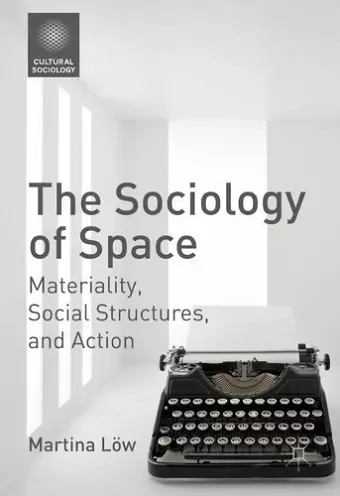The Sociology of Space
Materiality, Social Structures, and Action
Format:Hardback
Publisher:Palgrave Macmillan
Published:9th Sep '16
Should be back in stock very soon
This hardback is available in another edition too:
- Paperback£109.99(9781349695706)

"In an intellectual landscape whose dominant voice is from cultural geography, this is a true sociological theory of space: a critique of positivist and Newtonian subject-object space, in whose place Low proffers, neither consciousness nor being-in-the-world, but (with Georg Simmel) a figurational and social-relational constitution of space." (Scott Lash, Research Director, Centre for Cultural Studies, Goldsmiths University of London, UK) "This translation of Martina Low's book is an important contribution to the theorizing of space and place. Enormously rich in its breadth and deeply rigorous, Low engages with a range of theoretical positions from the global/local debate to those on bodies in space and with spatial forms as diverse as networks, neighborhoods, and territories. She presents complex concepts with absolute clarity. The Sociology of Space is an essential read for sociologists but also for all students of the city, its planning, and design." (Jyoti Hosagrahar, Director, Sustainable Urbanism International, Columbia University, USA) "This book helps the reader to better grasp what seems like a paradox: the category of 'space' in social sciences is neither spaces of flows nor spaces of places. Martina Low develops the idea of relational space, the inter-relationship of human agency and material structure. A highly recommended read!" (Alain Thierstein, Professor of Urban Development, Technical University of Munich, Germany)
In this book, the author develops a relational concept of space that encompasses social structure, the material world of objects and bodies, and the symbolic dimension of the social world.In this book, the author develops a relational concept of space that encompasses social structure, the material world of objects and bodies, and the symbolic dimension of the social world. Löw’s guiding principle is the assumption that space emerges in the interplay between objects, structures and actions. Based on a critical discussion of classic theories of space, Löw develops a new dynamic theory of space that accounts for the relational context in which space is constituted. This innovative view on the interdependency of material, social, and symbolic dimensions of space also permits a new perspective on architecture and urban development.
“Going well beyond Löw’s English-language articles (e.g. in this journal in 2013), the book makes her sophisticated and original theory of space available in its entirety to a far wider international audience. … a highly original and insightful book that should be obligatory reading for anyone working on space and place, and highly recommended for all urban scholars at graduate student level and above.” (International Journal of Urban and Regional Research, Vol. 41 (6), November, 2017)
“This is the first major work on theorization of space and place since the turn of the century, making for a compelling read on the subject. … Summing Up: Essential. Graduate collections in sociology, urban planning, and geography.” (T. Niazi, Choice, Vol. 54 (10), June, 2017)ISBN: 9781137487711
Dimensions: unknown
Weight: unknown
303 pages
2016 ed.